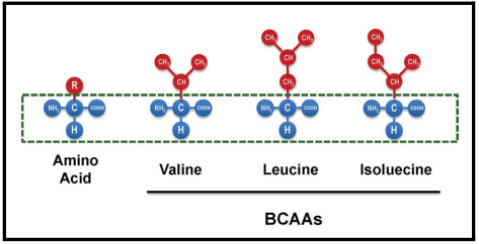
BCAAs, or branched-chain amino acids, are essential for the body as they are obtained from proteins in foods such as meat, dairy, and legumes. Leucine, isoleucine, and valine are the specific amino acids that make up BCAAs. These amino acids have a unique molecular structure that is described as "branched-chain." BCAAs are commonly used to reduce muscle breakdown, prevent fatigue, and improve athletic performance. In this article, we will explore BCAA in depth and discuss its numerous benefits.
Table of Contents:
What are BCAAs?
Performance Benefits of BCAAs
Dietary Sources of BCAAs
Take Home Message.
What are BCAAs?
Amino acids are the building blocks of proteins, which are essential for the human body. There are 22 different amino acids, including 13 non-essential amino acids that are produced by the body and 9 essential amino acids that are obtained from diet. The shape and function of each protein are based on the specific arrangement and quantity of its amino acids. In particular, leucine, valine, and isoleucine, also known as BCAAs, are necessary for muscle energy production.

The fitness and bodybuilding community has come to love BCAAs because of their potential advantages for improving muscle growth, training efficiency, and recuperation. Furthermore, studies indicate that BCAAs may enhance immunological function and lessen tiredness during extended exercise.
BCAA is efficiently used as an energy source for working muscles. When considering athletic performance, BCAA is exceptionally beneficial for:
Performance Benefits of BCAAs
- Muscle protein synthesis: BCAA stops protein degradation and the loss of muscle mass in the synthesis of muscle proteins. Your body needs a net positive balance of amino acids in order to create muscle. The breakdown of muscle tissue for energy occurs when the body enters a catabolic state, where muscle protein synthesis is less than muscle protein breakdown.
- Delays Fatigue: BCAA prevents the onset of fatigue (central and peripheral fatigue) during exercise sessions; therefore, the stronger you are, the longer you can sustain it throughout your exercise duration.
- Peripheral fatigue is when your muscles get tired. BCAA helps to delay the onset of peripheral fatigue by reducing the accumulation of certain compounds, such as lactate, that contribute to muscle fatigue. This allows you to maintain your strength and endurance for a longer period of time during exercise. During this, BCAA is used as a supplementary energy source for your prolonged exercise.
- Central fatigue occurs when your brain gets tired. During central fatigue, BCAA can help improve mental focus and reduce the feeling of exhaustion as it blocks tryptophan (a precursor for serotonin, which produces feelings of relaxation and sleepiness) from entering your brain, allowing you to push through intense workouts. By preventing both peripheral and central fatigue, BCAA supplementation can enhance overall exercise performance and endurance.
- Improves recovery: The faster the muscle fibres are repaired, the more the muscles will be able to resume training. Apart from being an energy booster during exercise, BCAA also plays an essential role in muscle fibre repair post-workout. Leucine, one of the BCAAs, activates the mTOR pathway (the mTOR pathway is a cellular signalling pathway that regulates protein synthesis, cell growth, and metabolism in response to various environmental and nutritional signals). This activation promotes the creation of new muscle proteins, aiding in the repair and growth of damaged muscle tissues during exercise.
- Supports Injury Healing: In addition to its role in muscle fibre repair, BCAA supplementation has also been shown to support injury healing. BCAAs can help reduce inflammation and promote the production of collagen, which is essential for tissue regeneration. This can be particularly beneficial for athletes recovering from sports-related injuries, as it can help speed up the healing process and improve the overall recovery outcome.
Dietary Sources of BCAAs
- Chicken Breast: Leucine, one of the essential BCAAs that is vital to the synthesis of muscle protein, is found in particularly high concentrations in chicken breast, making it a lean source of protein.
- Eggs: All nine essential amino acids, which the body is unable to create on its own, are found in eggs, making them a complete protein source. The three BCAAs—leucine, isoleucine, and valine—are included in this.
- Greek Yogurt: Greek yogurt is a high-protein dairy product that has a good ratio of each of the three BCAAs. It also contains a lot of casein protein, which releases amino acids gradually due to its slow digestion.
- Quinoa: Packed with all the necessary amino acids, including BCAAs, quinoa is a special plant-based source of complete protein. It's a fantastic choice for people who eat a vegetarian or vegan diet.
- Milk: Milk is another excellent source of complete protein, containing all nine essential amino acids, including BCAAs. Milk proteins such as whey and casein are naturally high in BCAAs
1 scoop of Optimum Nutrition Gold Standard 100% Whey contains 5.5 grams of naturally occurring BCAAs.
The daily required dosage of BCAA is 5 grams per day for an average adult in a ratio of 2:1:1 (Leucine : Isoleucine : Valine) . However, athletes and individuals engaging in intense physical activity may require higher doses to support muscle recovery and growth.
Take Home Message.
BCAA can be found in high-protein foods such as meat, dairy products, and legumes. However, it may be difficult to consume enough BCAA through food alone, especially for those with specific dietary restrictions or preferences. In such cases, opting for a BCAA supplement can help ensure an adequate intake and support overall wellness. Choose from a trusted brand and follow the recommended dosage instructions for optimal results. It is also important to consult with a healthcare professional or registered dietitian to determine the appropriate dosage for individual needs.

